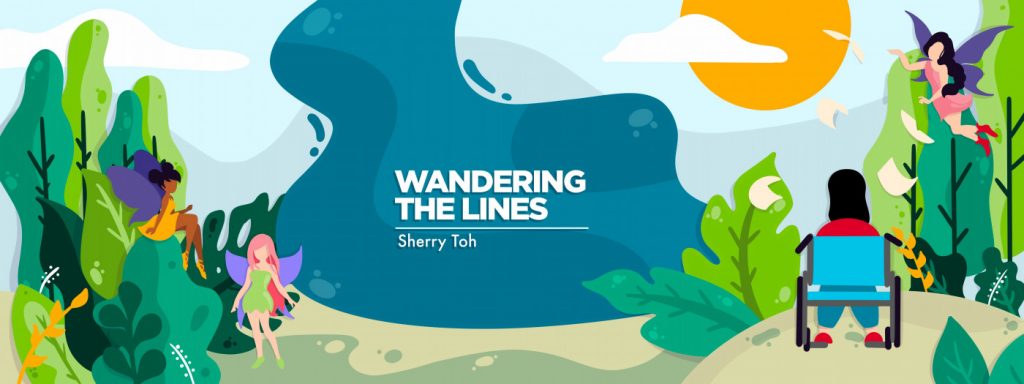We SMA patients might do more to help others than we realize

One of the hardest aspects of the SMA journey is a loss of independence. If I reach back into the deepest depths of my memory, the first time I can recall this happening was when I started using straws as a child. My mum had noticed I was having trouble picking up a cup with both hands after a hospital stay, and she decided I needed a little help to drink.
The next major memory of this sort I can recall is when I lost the abilities to turn my body during sleep and turn off my BiPAP. I used to flip myself like a pancake at night and wake to my head teetering off the edge of my pillow. If my parents were still asleep, I’d flip one last time to my right side, fight off the straps of my BiPAP, and reach for the machine on my nightstand. But as soon as I hit puberty, my ability to do all of that was as good as gone.
Then there was losing the use of my left arm. It happened so gradually that I didn’t notice until it was too late to slow the disease progression with exercises. Unfortunately, that meant I could no longer type or play games with a physical keyboard; I had to use assistive software or my iPhone’s touchscreen keyboard to help me.
The most traumatic memory is the most recent: when I lost the strength to hold up my head and body. I suddenly needed to be fed and monitored by someone sitting next to me. Despite gradually losing independence in little ways over the years, I’d never relied so much on others being around me, aside from periods when I was gravely ill. It was — and still is — a huge adjustment. I hated it. I sometimes still do.
Suffice to say, I’ve come to need a lot of help in my life.
Helping hands, meet helping minds
The thing about needing help all the time is that you can also lose sight of what you do to help others. You can feel like you’re just dead weight, a burden that takes and takes but never gives, a person no one would want around if not for pesky emotions getting in the way of practical logic.
Your mental health and self-esteem can be significantly affected, and the next thing you know, you need more help, this time from loved ones and mental healthcare professionals because you can’t find reasons to wake up every single day. It’s a vicious cycle.
Only recently did I realize SMA patients can and do help the people around us, and in many ways. We just don’t notice it because it’s not physical help.
For example, I’m the reason my 19-year-old brother, Gabriel, and I have tickets to see Ed Sheeran on Feb. 16. Since he was conscripted for military duty, Gabriel hasn’t had the time to sit at a computer and book tickets to a now sold-out concert — but I did. I took on that responsibility, just as I took on tutoring him in essay writing when he was in school.
I’ve also taken over some of the home administrative tasks from my mum, including booking transportation and medical appointments. And when my baby (really, 10-year-old) brother, Noah, is upset, I’m right there offering to buy him ice cream from McDonald’s to cheer him up.
In my friendship circles, I’m usually the one organizing the time and place for us to get together. I suggest activities for us to do and ensure we follow through and have a fun time. If we need to learn about a new place for lunch or someone has an issue that needs researching? I’m their girl. If they just need someone to talk to, I’m always happy to listen.
At work? I assist by holding the position of virtual assistant. I help with emails, spreadsheets, invoices, and the like.
The examples I listed are just the ones off the top of my head. There’s more that I either can’t remember while writing this column or maybe just haven’t recognized yet. But I do recognize that physical help isn’t the only valid type of help. It can come in emotional and mental forms, too.
Because February is the month of Valentine’s Day and SMA patients can have trouble loving ourselves, I’d like to challenge us to do so by recognizing and naming the ways we help and love others. You never know — you may be doing way more than you realize.
Note: SMA News Today is strictly a news and information website about the disease. It does not provide medical advice, diagnosis, or treatment. This content is not intended to be a substitute for professional medical advice, diagnosis, or treatment. Always seek the advice of your physician or other qualified health provider with any questions you may have regarding a medical condition. Never disregard professional medical advice or delay in seeking it because of something you have read on this website. The opinions expressed in this column are not those of SMA News Today or its parent company, BioNews, and are intended to spark discussion about issues pertaining to spinal muscular atrophy.
The post We SMA patients might do more to help others than we realize appeared first on SMA News Today.

